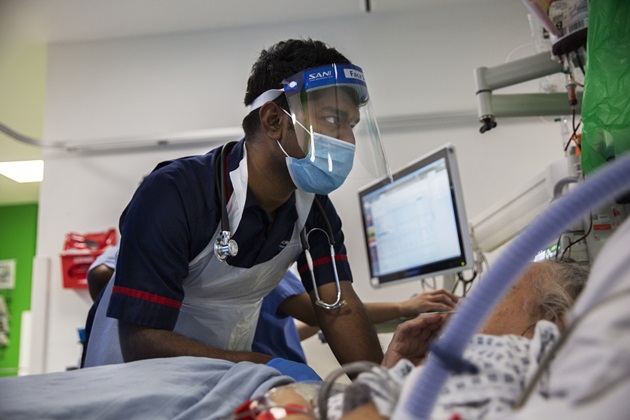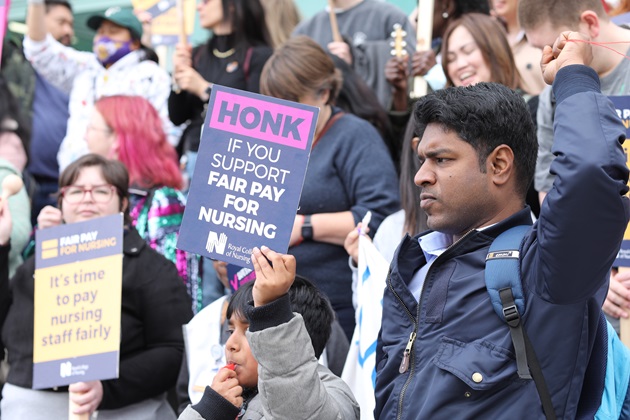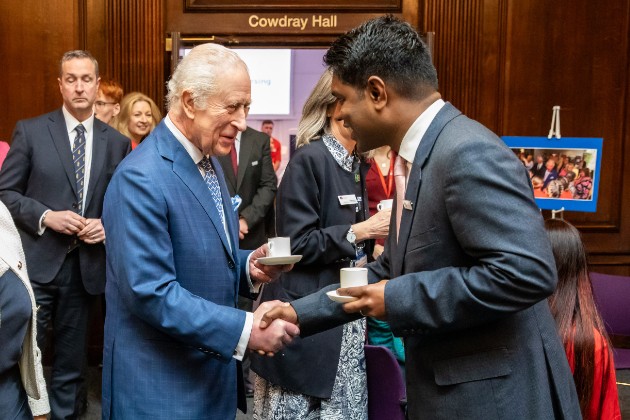He's now been a nurse for more than 20 years, but RCN President Bejoy Sebastian never set out with a nursing career in mind.
“It wasn’t a job I’d considered, and I never imagined it would be the role for me,” he says.
Growing up in Kerala, India, Bejoy wanted to study medicine after dabbling with the idea of being an engineer. “Back then, it wasn’t a good time to train in engineering as I wasn’t sure there was a future in it because of the recession," he says.
I wasn't confident and questioned myself all the time
He took the common medical entrance test which covers all areas of medicine in India including nursing, dental and veterinary. Following the exam, Bejoy chose nursing for his degree.
He admits he struggled with some of the training and had moments of self-doubt. “I enjoyed learning the facts and the science, but I wasn’t confident in the practical aspects and questioned myself all the time,” he says.
After completing his degree, he did a clinical placement in critical care. “Once I started practising nursing, I really enjoyed the work and knew I’d made a good choice.”
London calling
Bejoy had the opportunity to continue his critical care nurse training at Imperial College, London, after applying through an overseas recruitment drive in 2011. He travelled to the UK with a cohort of several other internationally educated nurses.
“It was my first time on a plane, and I was excited to go to London,” says Bejoy. “But it wasn’t easy.”
The health care system was different to what he’d been used to in India, he missed home and felt isolated.

“I lacked confidence on the ward as I found the practice very different compared to India and everything felt rushed,” he says. "I tended to take my time, wanting to know all the details, but this approach wasn’t always received well from other colleagues.”
Bejoy used his experience to support others by helping to found the Alliance of Senior Kerala Nurses, an initiative aimed at nursing staff from India transitioning to working in health care in the UK.
He worked across a few different hospitals in London before becoming a senior nurse in critical care at University College London Hospitals (UCLH) NHS Foundation Trust – a role he continues to do.
“After a few setbacks early in my career, I flourished and am glad I persevered,” he says.
Advocating for nursing
Bejoy now lives in London with his wife, also a nurse, and their 10-year-old son. When he first came to the UK, he joined the RCN to ensure he had union representation.
When RCN members voted to take strike action over pay in England and unsafe staffing more than two years ago, Bejoy began to get more involved with the College.

“The strikes changed the narrative around nursing,” he says. “People had to take notice now we were striking. I got fully involved with my colleagues on the picket line. It was challenging, especially as a manager in critical care, but I wanted to stand with my colleagues.”
The nursing strike action was a pivotal moment for Bejoy: “I realised, if I wanted to make a real difference, I needed to go to the core of the RCN into an elected role.”Balancing life and work
Now, finding his feet as RCN President, Bejoy is getting to grips with balancing this responsibility with work and family life.
“It’s an honour to be elected President and I’m thankful people believed in me enough to vote," he says.
He's committed to working with members and the College to shape nursing for the future, making it a profession to be proud of and excited to be in.
“Like many of those I represent, I go to work, look after my patients and then come home to my family – I’m just like many other nursing staff,” he says.
He wants to make an impact, ensuring pay justice and addressing workplace issues, especially in the independent care sector.
“People shouldn’t feel threatened at work or struggle in silence,” he says. “There are practices going on where people feel bullied, belittled or made to feel they can’t speak up because they might be threatened with losing their work visa. It’s modern slavery and I want to help stamp it out and ensure better working conditions for those affected.”
Collaborating with colleagues
Bejoy is hopeful that with his colleagues on RCN Council he can influence positive change in pay and working conditions.
“We want the same things, to advance the nursing profession and ensure working rights, better pay and conditions are a reality for all nursing staff in all sectors,” he says.
There's a historical legacy of injustice and misogyny
As part of his new role, Bejoy’s working alongside his RCN colleagues to ensure the RCN is at the forefront of conversations with those in power, fighting for the nursing profession and its needs.
Since becoming President, he recently joined General Secretary and Chief Executive Nicola Ranger at an RCN meeting with MPs on our calls to abolish corridor care, and at a meeting with health secretary Wes Streeting at the Department of Health and Social Care to discuss the government’s 10-Year Health Plan.

He also met His Majesty The King when he visited RCN Headquarters in London commemorating the 1000th nursing cadet to join the newly named King’s Nursing Cadets scheme, which allows nursing opportunities for young people.
“I want to use these opportunities meeting with policymakers and decisionmakers at the highest level to ensure the nursing voice is represented,” he says.
Valuing nursing staff
One of the main things Bejoy wants is for nursing staff to know they’re valued – with fair pay and better career progression. “For too long, nursing staff haven’t been valued in the same way as other health care workers.
“Pay is the issue that led me to stand for the role of RCN President – I wanted to do more to help us achieve fair pay that matches the skills that we use, to deliver complex care every day in our roles. There’s a historical legacy of injustice and misogyny regarding nursing pay, because it’s largely been seen as 'women’s work'. I want this injustice to end,” he says.
Want to get more involved in the RCN?
Nursing staff like you make the RCN what it is. Like Bejoy, you too can make a difference, influencing policy, pay and decisions about your profession by getting involved.
Find out more about our elected roles, how to become an RCN rep, or join one of our forums to connect with like-minded colleagues in your specialty.








